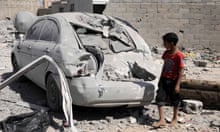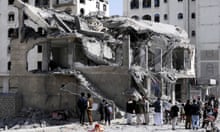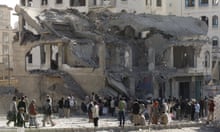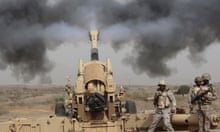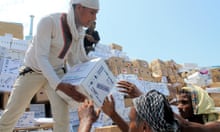“We are waiting to see when we will die” – the words of a resident of the besieged city of Taiz in Yemen, retold by a British Yemeni at a meeting with cross-party MPs in Westminster last week.
Taiz has been under siege by rebels for months, cut off from humanitarian aid, with no electricity, no schools, and where the vast majority of health facilities have closed.
Britain’s international development committee (IDC) had invited representatives of the Yemeni diaspora to contribute to our inquiry into the crisis in Yemen. We were shocked to hear about the desperate situation in Taiz, which bears a worrying resemblance to Madaya in Syria. But the world is watching Syria while the crisis in Yemen is largely ignored.
The crisis is having a devastating effect on the whole country. According to the UN (pdf), an astonishing 82% of the population needs humanitarian assistance - 21.2 million people, compared with 12.2 million in Syria. The food situation is particularly concerning, with 14.4 million people struggling to find enough to eat, including 1.3 million children who are acutely malnourished. Millions cannot access safe water or basic healthcare and 1.8 million children are out of school. The Yemeni diaspora described the situation as collective punishment, with the population being punished for the actions of the rebels.
But who are the rebels and how did this crisis happen? Yemen has a long history of conflict and instability, which had left it the poorest country in the Middle East. The current crisis escalated in March when a Saudi-led coalition launched airstrikes to stop the advance of the Houthi rebel group, which had taken control of the capital, Sana’a, and forced the government into exile in Saudi Arabia. It was meant to be a short sharp campaign by the coalition, yet has now dragged on for 10 months, leaving the country in tatters.
Civilians are paying a high price for this war. The UN high commissioner for human rights said on 5 January that there had been more than 8,000 civilian casualties since March, including 2,795 killed. Civilians account for half the deaths in this conflict, many from the reported use of explosive weapons in populated areas and attacks on hospitals and schools. The population have been living under the constant bombardment of aerial attacks and ground fighting. Reports of violations of international humanitarian law have been no less constant.
It has not only been the war that has had such a damaging effect on Yemen’s people. As the diaspora told the committee, the blockade on ports has been devastating, particularly for a country that imports 70% of its fuel, 90% of its food and all its medical supplies (pdf).
In September, fuel imports fell to 1% of the monthly requirements (pdf). As a result, hospitals are closing at an alarming rate and industry has come to a standstill. We heard from Yemeni businessmen that huge numbers of businesses have shut down, leading to high unemployment. The black market is inflating prices, especially for fuel which costs 286% more than it did before the war, according to the UN World Food Programme. Prices are skyrocketing at the same time as people are losing their incomes.
Peace talks held in Switzerland last month failed when the ceasefire was broken repeatedly by both the Houthis and the Saudi-led coalition. The talks were described to us as a “bit of theatre” while delegates continued to wage war.
On Wednesday, the IDC will hear from key stakeholders, including Unicef and Oxfam, and from both the Department for International Development (DfID) and the Foreign Office.
DfID has committed £85m to Yemen, making the UK the fourth largest donor to the humanitarian crisis. However, the UK is also the largest supplier of arms to Saudi Arabia and supports the coalition’s intervention, a position described in evidence to the committee as undermining DfID’s humanitarian response and creating a paradox of aid and arms.
I hope Wednesday’s meeting will provide an opportunity to draw attention to the catastrophic scale of the crisis and what the UK is doing and can do to help end the suffering.

